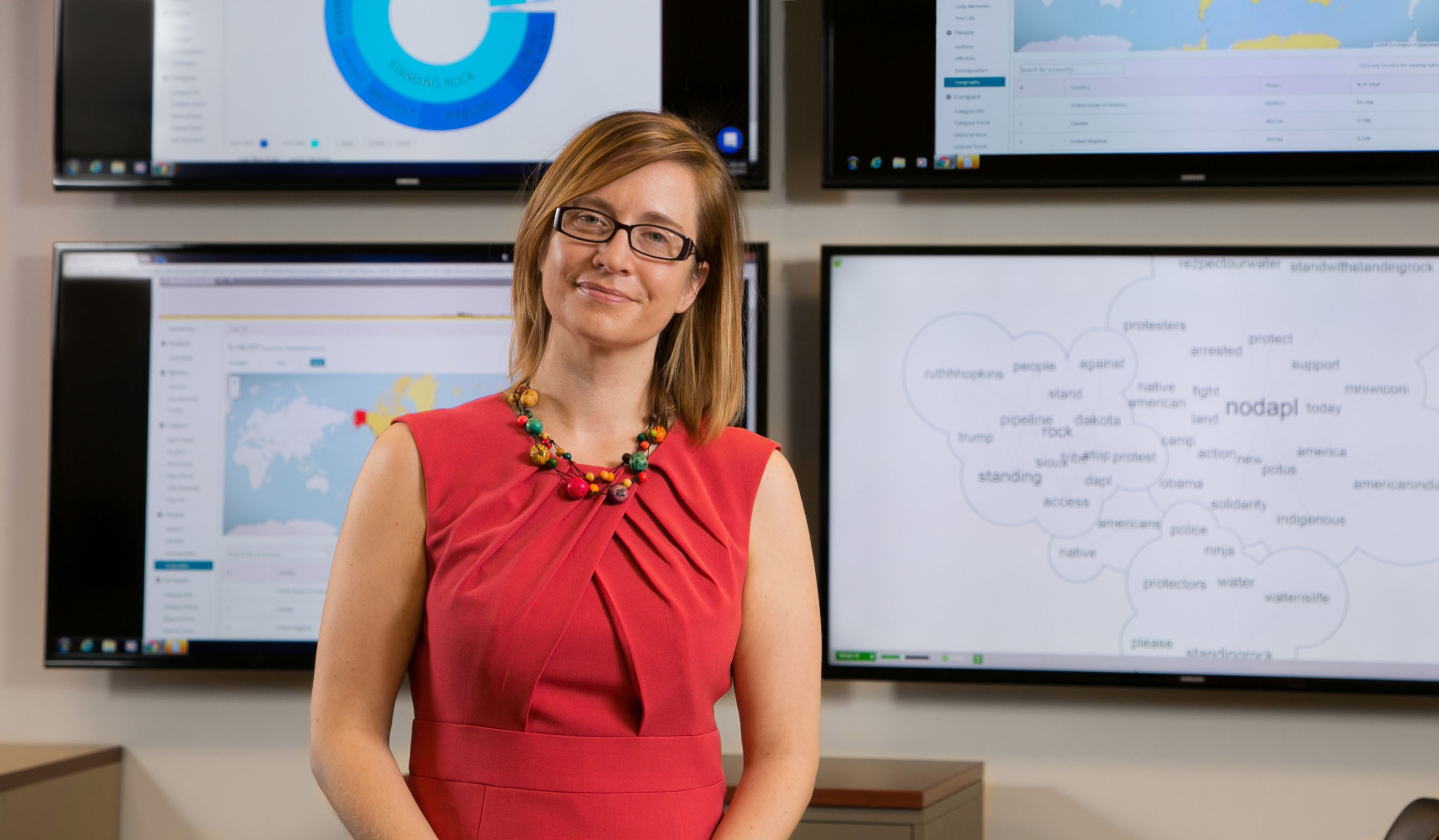 Jill Hopke, an assistant professor of journalism in the College of Communication, researches how the news media and social media shape the public’s understanding of climate change. (DePaul University/Rachel Laden)From frigid cold in the Midwestern U.S. to melting heat in Australia, extreme weather and climate change are making news around the world. Yet, the topic of climate change continues to be politicized, and journalists often struggle to cover it in a way that’s accurate and evidence-based, according to Jill Hopke, an assistant professor of journalism in the College of Communication.
Jill Hopke, an assistant professor of journalism in the College of Communication, researches how the news media and social media shape the public’s understanding of climate change. (DePaul University/Rachel Laden)From frigid cold in the Midwestern U.S. to melting heat in Australia, extreme weather and climate change are making news around the world. Yet, the topic of climate change continues to be politicized, and journalists often struggle to cover it in a way that’s accurate and evidence-based, according to Jill Hopke, an assistant professor of journalism in the College of Communication.
A founding member of the International Environmental Communication Association, Hopke researches how the news media and social media shape the public’s understanding of climate change. She contributed to the Oxford Encyclopedia of Climate Change Communication, a special project of the Oxford Research Encyclopedia of Climate Science. Hopke recently published one of the first studies of climate visuals on social media with Luis Hestres of the University of Texas at San Antonio in the journal Social Media + Society. She also attended last year’s UN climate talks in Katowice, Poland, as an observer.
In this Q&A, Hopke discusses how journalists can focus on scientific consensus and local issues to boost the public’s understanding of climate change.
Extreme weather events always make the news. How can journalists ensure they’re reporting accurately on the connections between say, a heat wave, and climate change?
The news media clearly contributes to public understanding of climate change. In some cases, they do so while trying to adhere to journalistic norms of objectivity and balance that continue to hinder evidence-based climate reporting. What I mean by that is given that the there is broad agreement among climate scientists that climate change is happening and that it’s driven by burning fossil fuels, it would not be accurate to give equal space to the views of groups and individuals seeking to cast doubt on the prevailing scientific consensus.
Another area that requires a deeper understanding by the news media is climate attribution, which is a sub-field of climate science. The goal is to explain the extent of climate risk associated with individual extreme weather events, like heat waves, as opposed to natural variability. Gaining a better understanding of the difference can help improve both reporting generally and public understanding of the issue overall.
How can journalists tell the difference in a weather event that happens normally and one that is influenced by climate change?
First, it is important to understand the difference between climate and weather. A good way to understand this distinction is the analogy that climate is what you keep in your closet and weather is what you wear on any given day.
Beyond that, there are exciting advancements in the field of climate attribution, such as work by the World Weather Attribution project, which is a partnership of the Environmental Change Institute at the University of Oxford, the Red Cross Red Crescent Climate Centre and Royal Netherlands Meteorological Institute. For example, researchers there found that for Hurricane Harvey in 2017, the record rainfall Houston experienced was made three times more likely because of climate change. Based on science like this, what we can increasingly say is the extent to which individual extreme weather events are, or are not, influenced — meaning made more, or less, likely to occur — by climate change. An analysis by the specialist news outlet CarbonBrief found in reviewing 20 years of peer-reviewed studies on 260 extreme weather events that in more than two-thirds of the cases (68 percent) the extreme weather events were made more likely, or more severe, because of climate change.
Can you provide an example of how the news media might work climate change into their regular coverage of the weather or other local stories?
In Chicago, a story on public transit infrastructure during the January Polar Vortex included a quote about how transit systems need to prepare for an increase in extreme weather events in the future due to climate change. That’s a climate adaption story. Journalists should work to expand reporting to look at climate issues related to such areas as public health, business, clean energy, public infrastructure, food systems, arts and culture, sports, religion and disaster preparedness.
Hopke is among the hundreds of DePaul faculty who offer their expertise to members of the news media through the DePaul Experts Guide. Are you a faculty member interested in speaking with the media? Learn more about the guide in Newsline.